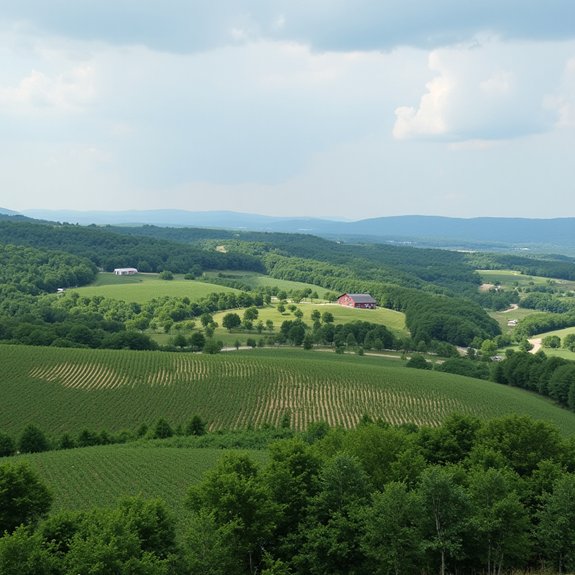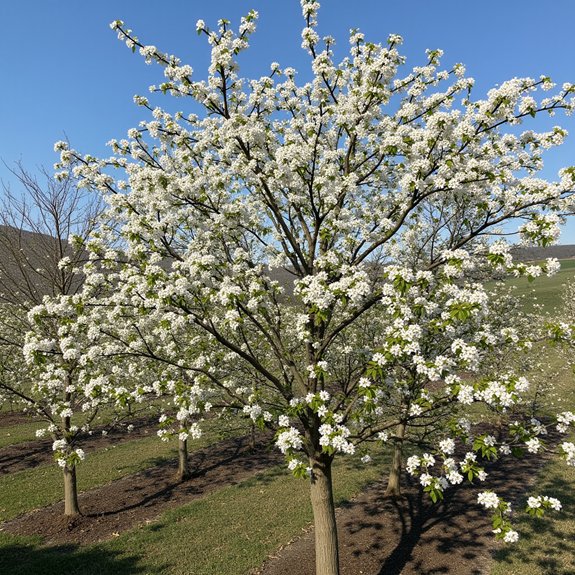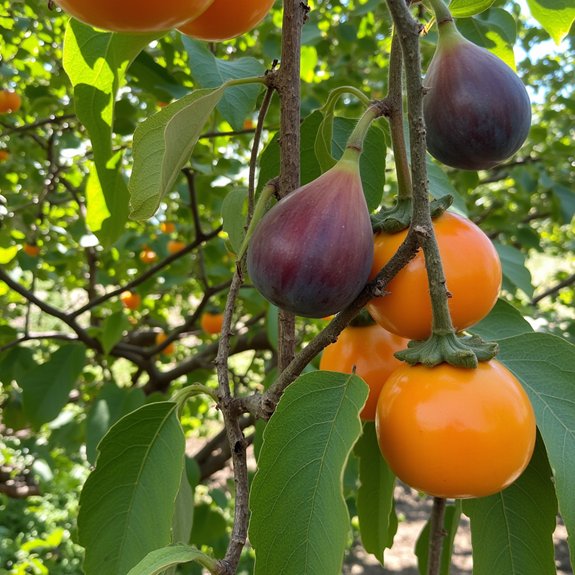Tennessee gardeners enjoy a unique advantage when selecting fruit trees, as the state’s diverse climate zones allow for an impressive variety of options that wouldn’t survive in harsher regions. From the cooler mountains in Zone 5b to the warmer valleys in Zone 8a, different areas support everything from cold-hardy apples to heat-loving figs. However, choosing the wrong variety for your specific location can lead to years of disappointment and wasted effort.
Contents
- 1 Tennessee’s Ideal Climate for Growing Fruit Trees
- 2 Apple Trees: A Reliable Choice for Tennessee Gardens
- 3 Pear Trees: Low-Maintenance Fruit Production
- 4 Stone Fruits That Thrive in Tennessee’s Climate
- 5 Figs and Persimmons: Native and Adapted Options
- 6 Quince and Apricots: Specialty Fruits for Patient Gardeners
- 7 Elderberry Trees: European Varieties for Fall Harvest
- 8 Mulberry Trees: Sweet Fruits and Natural Windbreaks
Tennessee’s Ideal Climate for Growing Fruit Trees

When it comes to growing fruit trees, Tennessee gardeners hit the jackpot with nearly perfect growing conditions. The state’s mild climate spans USDA Zones 5b through 8a, creating ideal temperatures for diverse fruit tree selection. Ample rainfall throughout the year naturally supports tree growth, reducing irrigation needs markedly.
However, successful fruit growing requires attention to key details. Proper soil drainage prevents waterlogging, which can kill even hardy varieties. Plant trees in locations that avoid cold air pockets, where frost damage occurs most frequently. Regular fertilization and annual pruning enhance both fruit production and overall tree health considerably.
Apple Trees: A Reliable Choice for Tennessee Gardens
Among all fruit tree options, apple trees stand out as Tennessee’s most dependable choice for both novice and experienced gardeners. These hardy trees thrive in Tennessee’s USDA Zones 5-8, requiring minimal fertilizer and less frequent pruning than most fruit varieties. Apple varieties like ‘Liberty’ offer excellent disease resistance while providing self-pollinating capabilities, eliminating cross-pollination concerns.
Plant apple trees in spring, choosing sunny locations with good airflow to prevent common diseases. Most varieties need cross-pollination, so consider planting multiple cultivars nearby. With proper placement and basic care, Tennessee gardeners can expect crisp, juicy apples within just a few growing seasons.
Pear Trees: Low-Maintenance Fruit Production

Pear trees offer Tennessee gardeners an exceptionally forgiving fruit-growing experience, requiring less attention than apples while delivering consistently delicious harvests. These adaptable trees thrive in USDA Zones 4-8, making them perfect for Tennessee’s varied climate conditions.
Superior disease resistance sets pears apart from other fruit trees, reducing the need for chemical treatments or intensive monitoring. They’ll tolerate different soil types and even grow well in containers for smaller spaces.
Effective pear tree care involves planting two cultivars like ‘Bartlett’ and ‘Comice’ together for cross-pollination. Choose sunny locations with good airflow, and protect early spring blooms from unexpected frost damage.
Stone Fruits That Thrive in Tennessee’s Climate
Since Tennessee’s warm climate perfectly matches their growing requirements, stone fruits like peaches, plums, and cherries flourish throughout the state’s USDA Zones 6-8. Peaches lead the pack, producing fruit within one to two years when planted in full sun with well-draining soil. Regular pruning techniques maintain tree health and improve fruit quality considerably.
Plums handle unexpected cold spells better than other stone fruits, requiring around eight hours of direct sunlight daily. Cherry trees need annual pruning and benefit from netting protection against birds.
All stone fruits require consistent watering and effective pest management strategies for peak production.
Figs and Persimmons: Native and Adapted Options

While most gardeners overlook them, figs and persimmons represent Tennessee’s best-kept secrets for low-maintenance fruit production. Figs thrive in Tennessee’s warmer regions, zones 6-7, requiring minimal care once established. Popular fig varieties like ‘Celeste’ and ‘Hardy Chicago’ need frequent watering due to shallow roots, but they don’t require fertilizing in proper soil.
Persimmon care proves even simpler, as these native trees tolerate zones 4-9 with remarkable neglect tolerance. Common persimmons handle various soil conditions without amendments, though mulching helps after soil warms. Most aren’t self-pollinating, so choose hybrid cultivars for reliable fruit production and maximum garden success.
Quince and Apricots: Specialty Fruits for Patient Gardeners
For gardeners who enjoy planning ahead, quince and apricot trees offer unique rewards that justify their longer timelines. Quince cultivation requires patience, as these ornamental beauties take up to 10 years for ideal fruit production. They’re primarily grown for cooking rather than fresh eating, making excellent jams and jellies.
Apricot varieties suit Tennessee’s zones 5-8 perfectly, staying compact for smaller gardens. They flower early, so choose hardier cultivars in frost-prone areas. Both trees need full sun and consistent watering, with apricots requiring more pest management than low-maintenance quince.
Elderberry Trees: European Varieties for Fall Harvest
European elderberries (Sambucus nigra) grow as true trees rather than shrubs, producing their prized dark berries in fall when most other fruits have finished. These elderberry varieties thrive in Tennessee’s zones 5-7, creating an extended harvest season when apples and pears are winding down.
Fall harvesting typically occurs in September and October, when clusters of deep purple berries hang heavy on branches. The trees prefer full sun but tolerate partial shade, though reduced sunlight decreases fruit production.
Regular pruning keeps trees manageable and productive. Unlike their American counterparts, European varieties offer better structure for small gardens while delivering excellent yields for jellies and wines.
Mulberry Trees: Sweet Fruits and Natural Windbreaks
Mulberries deliver sweetness that rivals store-bought berries, plus they’re tough enough to shield gardens from harsh winds. These hardy trees thrive in Tennessee’s USDA Zones 4-8, with black mulberry varieties preferring warmer conditions above zone 6.
Mulberry varieties include black, red, and white options, all suitable for Tennessee gardens. They’re remarkably low-maintenance performers that tolerate drought conditions without requiring fertilizer.
Mulberry care involves minimal effort since these trees practically take care of themselves. Plant them in full sun with well-draining soil, and they’ll reward you with sweet fruits perfect for eating fresh, making jams, or brewing wine.
